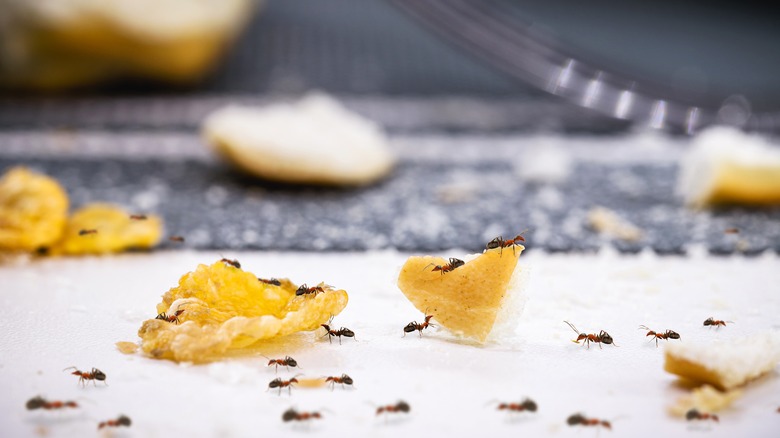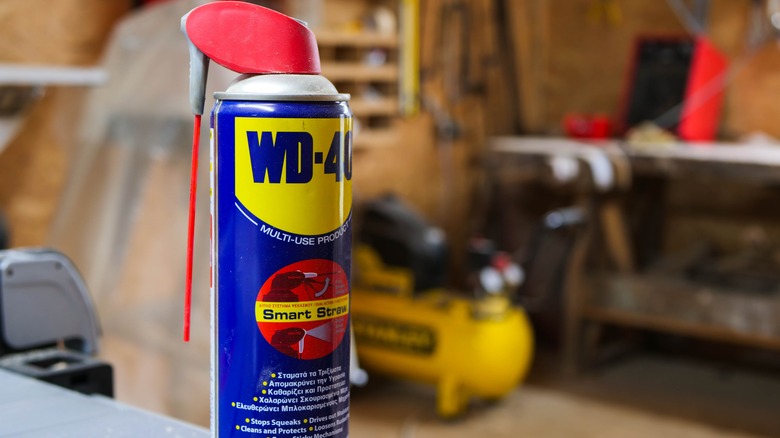The Garage Essential That Doubles As A Powerful Ant-Repellent
Facing an ant invasion in your home or garden? You might be surprised to learn that WD-40, a common household lubricant, is being touted as an effective ant repellent. This unconventional use of WD-40 in the home is gaining attention online, although it's important to note that the evidence for its effectiveness against ants is largely based on personal experiences rather than scientific research. The potential insect-repelling properties of WD-40 might be attributed to some of its ingredients, notably aliphatic hydrocarbons, which constitute about 50% of its formula. A 2007 article by the U.S. Environmental Protection Agency pointed out that aliphatic hydrocarbons have potential insecticide properties. However, for a product to be used as an insecticide, these compounds are usually present at a concentration of 97% or more. With WD-40's lower concentration, its efficacy as an ant-repellent may be less certain.
Despite the lack of scientific backing, many individuals swear by WD-40's ability to ward off ants. If you're dealing with ants, experimenting with WD-40 could be a step worth considering, especially when used as part of a broader strategy for ant control. It's essential to use the product safely, adhering to its guidelines. Understanding the behavior and preferences of ants is also key to effective control. Tackling an ant problem often requires a multifaceted approach, combining various repellent methods for optimal results.
Exploring ant behavior and applying WD-40 effectively
To effectively combat ants with WD-40, it's crucial to first understand why these tiny invaders frequent our homes and gardens. Ants are primarily drawn to areas where they can find food and water. This means kitchens, with their crumbs and spills, are often a hotspot for ant activity. Additionally, gardens and yards, especially those with standing water, create damp environments that ants find attractive. Overwatering also creates ideal conditions for ants. When you decide to use WD-40 as a repellent, focus on the ants' favorite spots. Common entry points in your home include doorframes, windowsills, and any visible cracks or crevices in walls and foundations. A strategic spray of WD-40 around these areas might deter ants from entering. However, exercise caution when using WD-40, especially in areas frequently accessed by children and pets, and avoid its use in places where food is prepared or stored.
In your garden or yard, look for ant trails or nests. Some garden ants, like the thief ants, are typically found in soil, under rocks, or near plants that attract insects. A light application of WD-40 in these areas can disrupt the ant trails and deter them from returning. Remember, the goal is not to saturate the area but to apply enough to create an unwelcoming environment for the ants.
Integrating WD-40 with other ant-deterrent strategies
While WD-40 may play a role in your ant control plan, it might be more effective when used in conjunction with other deterrent methods. As mentioned earlier, ants are attracted to food and moisture, so your first line of defense is to eliminate these attractants. Start by keeping your kitchen clean. Regularly wipe down counters, store food in sealed containers, and dispose of garbage promptly. This reduces the food sources that attract ants. In your garden, you might need to adjust your watering schedule to prevent excessive moisture. Allow the soil to dry between waterings. Additionally, you can sprinkle natural deterrents like diatomaceous earth around the garden. This non-toxic powder is effective against a variety of pests, including ants, without harming your plants.
Inside your home, natural repellents can be a safer alternative to chemical products, especially in areas frequented by children and pets. If the smell of the WD-40 is too strong, consider using vinegar or essential oils like lemon eucalyptus oil, peppermint oil, or tea tree oil, as advised by Healthline. You can apply these with a spray bottle around potential entry points and in areas where ants are seen. If the ant problem persists, it might be time to call in professional pest control services. They can identify the species of ant you're dealing with and provide targeted treatment options. Remember, some ant species, like carpenter ants, can cause structural damage to your home, so professional intervention can prevent more serious issues.


